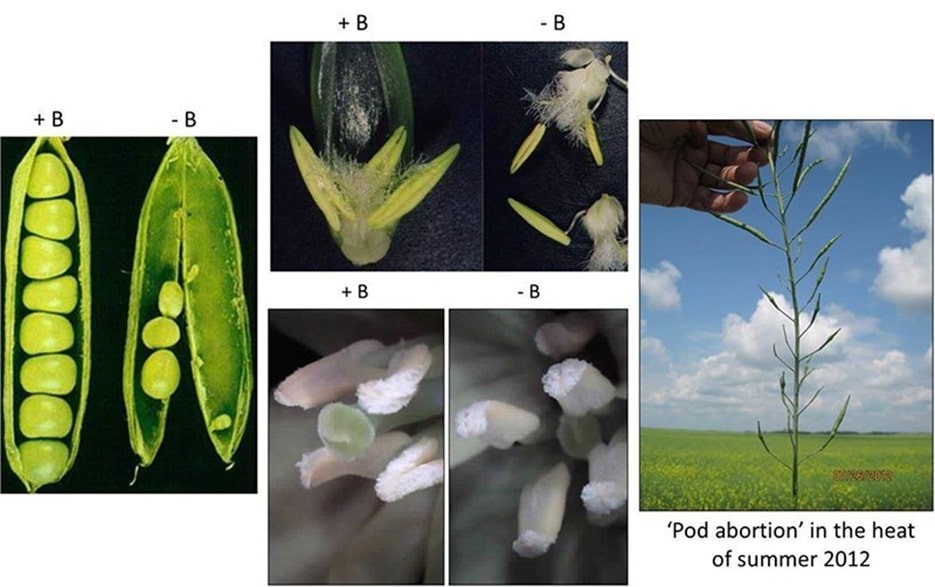Mitigating Heat During Flowering
Flowering is one of the most important stages in a crop’s life cycle and often happens during the hottest days of summer – ideal conditions for a less-than-ideal situation: heat stress. When conditions are right for heat stress, it is especially important to pay attention to boron (B) – a micronutrient that is critical to pollen tube growth and the germination of pollen grains and fertilization, helping to ensure good grain fill and yield.
The Effects of Heat Stress
Plants reaching the reproductive stage and shifting the bulk of their energy production to flowering are especially susceptible to heat stress brought on by soaring temperatures. If boron is deficient during this stage, flowering is shortened and only a few pollen grains can germinate; pollen tubes grow slower and often abort before reaching the ovules.
In canola, this creates a condition called heat blast (aka pod abortion), which is characterized by a higher than usual number of aborted flowers, causing blanks on the stem, and flowers with shortened stamens, which do not produce pods. In cereals, heat stress causes poor grain filling. In both cases, the result can be significant yield loss.
The Boron Connection
During the critical reproductive stage, the crop has an increasing demand for boron. Unfortunately, boron can become deficient during periods of extreme heat. Under hot/dry and hot/humid conditions, plants will shut down their stomata to reduce water loss, jeopardizing nutrient and water uptake. Because it is immobile in the plant, boron cannot be stripped from leaves to meet the increasing demand by the flowers; once absorbed, it cannot be redistributed.
Compared to other micronutrients, a plant’s boron requirements are relatively low; however, it is important to maintain an adequate level throughout the crop’s life cycle, supplementing as necessary during the reproductive stage to preserve yield. When timed correctly, a readily-available supply of boron can reduce plant-stress and protect yield by helping to ensure optimal pollination, better seed fertilization and development, and a reduced number of pod blanks.

How Can OMEX Help?
Make boron part of your plant nutrition program to help your crops mitigate the effects of heat this summer. Super B and KB78, formulated for improved uptake during hot, dry conditions with a high analysis of boron, can be applied during the flowering stage to promote pollen formation and fertilization, and reduce the occurrence of heat blast.
Both Super B (10% B) and KB78 (8% B) provide the most available form of boron, boric acid. KB78 also contains potassium (7% K) to mitigate K deficiency, a common occurrence during hot weather.
Talk to your Ag retailer or OMEX sales representative for more information on how OMEX Primers, Starters, Foliars (including Super B and KB78), PGRs, Biologicals and Biostimulants can preserve the yield and quality of your crops, even when things heat up.
